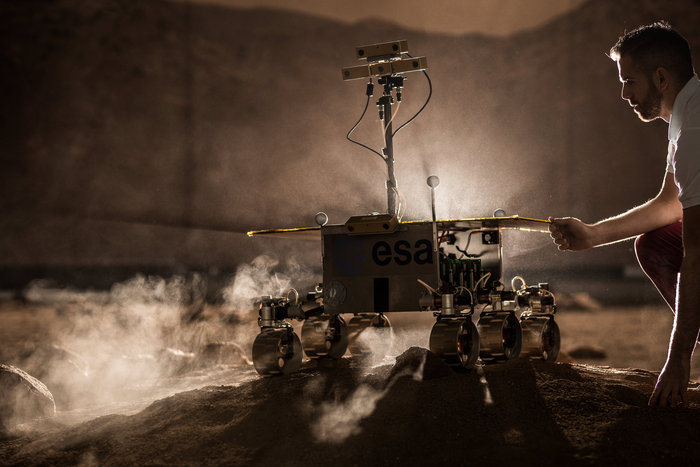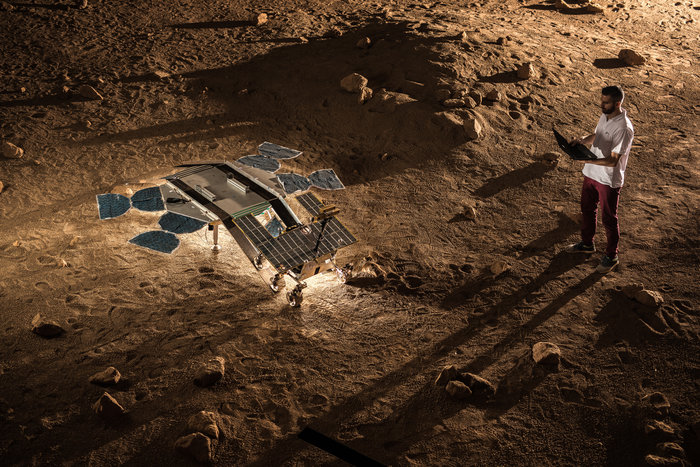Here's How Europe's Rosalind Franklin Rover Will Phone Home From Mars
Breaking space news, the latest updates on rocket launches, skywatching events and more!
You are now subscribed
Your newsletter sign-up was successful
Want to add more newsletters?
Europe's future Mars rover has a place to call home while en route to Red Planet discoveries. The European Space Agency opened its new rover operations control center on May 30 in Turin, Italy.
The new ExoMars mission rover, named Rosalind Franklin, will land on Mars in 2021 aboard a Russian surface platform called Kazachok. The major mission goal is to look for signs of ancient habitability at Oxia Planum on Mars — and each step of the way, controllers in Italy will be telling the rover where to go next.
"This is the crucial place on Earth from where we will listen to the rover's instruments, see what she [sic] sees and send commands to direct the search for evidence of life on and under the surface," Jan Wörner, ESA's director general, said in a statement.
Related: Why We Can't Depend on Robots to Find Life on Mars
The Italian rover control center is a combination mission control center — which will communicate with Rosalind Franklin — and a next-door Mars yard where controllers can practice rover driving. While Rosalind Franklin must be somewhat autonomous (because a signal sent to Mars can take anywhere between 4 and 24 minutes to arrive, depending on the distance from Earth), the Mars yard is a spot where controllers can simulate scenarios when they have time to spare.
The yard is filled with 154 U.S. tons (140 tonnes) of soil, and features a large tilting platform that can simulate up to 30 degrees of inclination. This means that controllers can practice Rosalind Franklin's traverses on the Red Planet, tackling challenges like large rocks, steep hills and other tricky terrain.
Controllers can also simulate drill operations, which will be important because Rosalind Franklin will carry the largest drill yet placed on Mars, capable of burrowing up to 6.5 feet (2 meters) under the surface. The Mars yard also has lamps that simulate the lighting conditions on the Red Planet, which is different than Earth in part due to Mars' dusty sky.
Breaking space news, the latest updates on rocket launches, skywatching events and more!
"Besides training and operations, this fit-for-purpose center is ideal for troubleshooting," Luc Joudrier, the ExoMars rover operations manager, said in the same statement.
The rover is well under construction at Airbus Stevenage in the United Kingdom, anticipating its launch date next summer. The drill and several scientific instruments (also known as the Analytical Laboratory Drawer) are now integrated on the rover. Soon, engineers will install a panoramic camera.
This summer, the rover will be tested in simulated Mars conditions in Toulouse, France. Then Rosalind Franklin will move to Cannes, France, for final assembly, including installing the landing and carrier modules.
The ExoMars program — a collaboration between Europe and Russia — successfully placed the Trace Gas Orbiter in orbit around Mars in 2016. TGO performs scientific observations of the Martian atmosphere, and it also will support Rosalind Franklin's entry, descent and landing. A small ExoMars demonstration lander called Schiaparelli rode to Mars with TGO, but crashed into the surface.
NASA is also planning to launch a rover next year, called Mars 2020. This rover will cache the most promising samples of material in preparation for a possible robotic sample-return mission that could fly to the Red Planet in a few more years. The 2020 mission will also carry the first marscopter to do test flights above the surface of another planet.
- These Are the Last Photos NASA's Opportunity Rover Took on Mars
- See a Martian Sunrise (and Sunset, Too!) in Gorgeous NASA InSight Photos
- Amazing Mars Photos by NASA's Curiosity Rover (Latest Images)
Follow Elizabeth Howell on Twitter @howellspace. Follow us on Twitter @Spacedotcom and on Facebook.

Elizabeth Howell (she/her), Ph.D., was a staff writer in the spaceflight channel between 2022 and 2024 specializing in Canadian space news. She was contributing writer for Space.com for 10 years from 2012 to 2024. Elizabeth's reporting includes multiple exclusives with the White House, leading world coverage about a lost-and-found space tomato on the International Space Station, witnessing five human spaceflight launches on two continents, flying parabolic, working inside a spacesuit, and participating in a simulated Mars mission. Her latest book, "Why Am I Taller?" (ECW Press, 2022) is co-written with astronaut Dave Williams.


